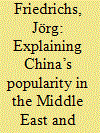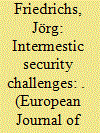| Srl | Item |
| 1 |
ID:
167576


|
|
|
|
|
| Summary/Abstract |
China enjoys considerable popularity in the Middle East and Africa, not only among elites but also at street level. This article draws on international relations theories to explain this general pattern, as well as intra- and interregional variation. Every approach has something to contribute, but international political economy more so than realism. Constructivist theories are particularly useful in explaining China’s popularity in the Middle East and Africa.
|
|
|
|
|
|
|
|
|
|
|
|
|
|
|
|
| 2 |
ID:
158953


|
|
|
|
|
| Summary/Abstract |
Intermestic security challenges arise when there is concern in a country that a dissatisfied minority relies on transnational bonds with a foreign kin group for support. They result from ethnic and/or ideological affinities translating into foreign support seen as problematic, and they are aggravated when the dissatisfied minority is able to raise territorial claims. This can lead to complications not only in domestic politics, but also in international relations (hence, the term ‘intermestic’). Intermestic challenges can escalate into civil war and other political calamities, but they can also be managed by governments. This article develops a theoretical model and discusses it with regard to China and its Muslim-majority neighbouring countries. To the west of China, transnational bonds of Uyghur Muslims in Xinjiang with co-ethnics and coreligionists in Central Asia, Pakistan, and Afghanistan complicate Chinese relations with those countries. In the southeast, transnational bonds of ethnic Chinese in Indonesia and Malaysia with their ancestral homeland have complicated Indonesian and Malaysian relations with China. While the cases have followed different trajectories, Beijing has managed either challenge rather successfully. The theoretical model developed and the management strategies discussed are likely to be useful in other contexts.
|
|
|
|
|
|
|
|
|
|
|
|
|
|
|
|